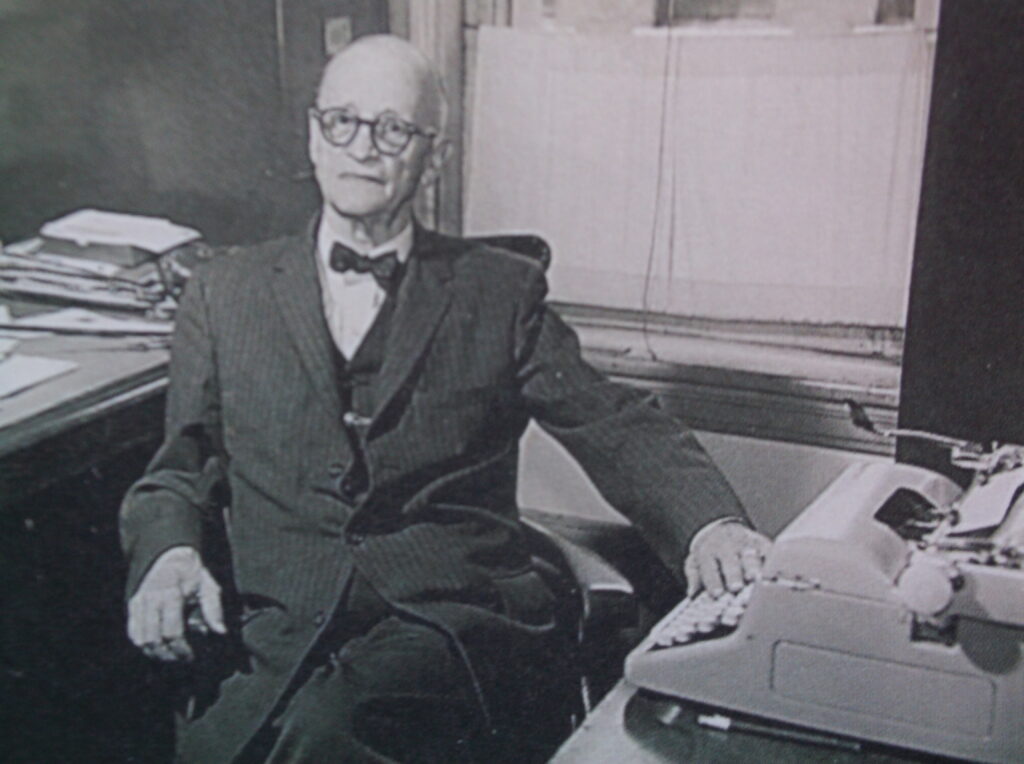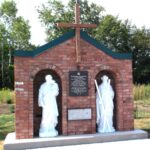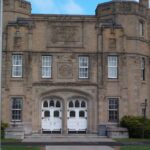
Dr. Alfred John Lalonde was born in Renfrew County. He earned his medical degree at Queen’s in 1904 and then interned in New York City. He started his career in one of Quebec’s numerous and dangerous lumber camps.
In 1907, Lalonde moved to Cornwall and established a clinic in St. Regis. In Cornwall he served on the secondary school board, where he met Rose E. Healy, a teacher at Cornwall Collegiate Institute (CCVS), whom he married. In 1910, he opened his office at 237 2nd St. E., where he practised until 1952.
As part of his duties, Dr. Lalonde organized the Hotel Dieu’s first maternity ward in 1915. Twenty years later he was instrumental in establishing the hospital’s accreditation with the American College of Surgeons.
Active in the Cornwall’s francophone community, Lalonde became a Grand Knight of the Knights of Columbus.
The Lalondes had three sons. Laurence joined the R.C.A.F and died during the Second World War. Edward lived in Montreal. And after serving as a Lieutenant with the SD&G Highlanders during the War, Charles F. Lalonde became a doctor, specialising in gynecology and obstetrics in Cornwall from 1960 – 91.
Senator Donald D.McMillan, MD.
Born in Lochiel Township to farmers Duncan and Mary (McDonald), and educated locally, McMillan grew-up to become one of those famous, 19th century self-made Glengarrian men. First trying his hand at teaching in Dunvegan, he moved to southwestern Ontario where he dabbled as a merchant and married Amy Ann Lewis from Alymer, Canada West, in 1857. He then moved to Cobourg to study medicine at Victoria University (now closed to become part of the University of Toronto), to graduate in 1865.
Fluent in Gaelic, McMillan opened his medical practise in Alexandria a year later and rose to become County Coroner.
Fully engaged in community activity, McMillan had financial interests in several mills and served on the boards of various financial institutions.
He found his real calling in community affairs and served as Justice of the Peace, and as member of both Township and County Councils. An ardent Conservative , his entry in the Dictionary of Glengarry Biography, states that his claim to fame and reason for his appointment to the Canadian Senate, after he was defeated for a seat in Parliament, lies in his opposition to the overwhelming political influence of Glengarry County’s Sandfield Macdonalds.
In the Senate, he was the only Roman Catholic member to vote for the second reading of the bill to incorporate the very Protestant Orange Order. In the Red Chamber, in response to the theft of former Glengarry M.P. Patrick Purcell’s cadaver for ransom, McMillan tried to have a bill passed to make grave robbing illegal. It was defeated according to historian Royce MacGillivray when Dr. Sullivan of Queen’s Medical School “…cautiously, but firmly defended the ancient rights of medical students to make whatever provision they must for themselves,” to find corpses for study.
MacGillivray summed up McMillan’s character from his obituary in the “Glengarry News,” which said: “He was a man of most retentive memory, a good story teller and conversationalist, widely read and at all times hospitality itself to friends and neighbours. An enthusiastic Highland Scotchman he delighted in speaking and writing Gaelic , was the composer of a number of Gaelic songs and was elected an honorary member of the Celtic and Highland Societies of Montreal.”
Competitive cyclist George Smith became one of Cornwall’s most influential teachers after an accident ended his days on his bike.
As public schools did not teach commercial programmes, Smith filled this void by opening the Cornwall Commercial College, on the second floor of Pitt’s Snetsinger Block in 1896.
Smith offered courses in the most up-to-date office procedures and equipment, which in pre computer days included typewriters, adding machines, and card indexes. Instruction was given in filing, shorthand, which might top 150 words a minute, and banking at the College’s model bank.
Within five years of opening, the College counted 30 male and 23 female students. taught by five instructors. The College’s reputation grew to the point that before World War I, students came from across Canada, the U.S. and Britain.
Smith said “…the student must be dull indeed who does not, in the five or six months’ course acquire business habits and hints which will stand him in good in any walk of life.”
Employers agreed and in 1926 Smith could boast that “in the offices of Cornwall for the past 30 years, practically 100 per cent of the calls for office assistance have been for C.C. graduates. More than 1,000 graduates have been sent to Montreal alone.” The College’s faculty also did well. Instructor Oscar F. Skelton, left to become Secretary of State for External Affairs in Ottawa.
Over time commercial courses were added to the curriculum of Ontario’s high schools, and this “free” competition, coupled with ill health, led Smith to retire in 1962, leading to the College’s closure a year later.
The Snetsinger Block, on the southwest corner of Pitt and 1st Streets was destroyed by fire in November, 1972 erasing all physical traces of the school.









